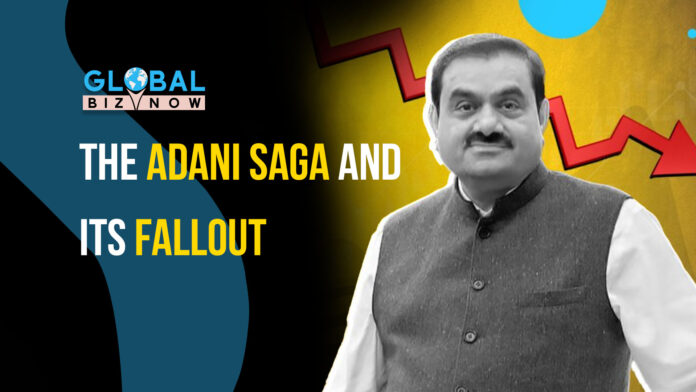Shares of companies of Adani Group dropped by as much as 20% to an intra-day low on Thursday, November 21, after allegations rocked the conglomerate’s chairman, Gautam Adani, and several executives, apparently creating a multibillion-dollar bribery and fraud scheme in the United States.
Adani Group Faces Serious Allegations
Reuters and Bloomberg report says that the charges include alleged bribes by Adani to Indian officials to acquire richly remunerated solar energy contracts. The indictment, involving Gautam Adani, his nephew Sagar Adani, and top officials at Adani Green Energy, as well as Cyril Cabanes of Azure Power Global Ltd, outlines a massive scheme to defraud investors in the United States and institutions around the world. The allegations have sent shockwaves through markets, leaving investors questioning one of India’s biggest industrial empires.
The Alleged Fraudulent Scheme
It paints a damning picture as it claims that the group conspired to commit securities fraud . The case centers on an enormous scheme meant to deceive U.S. investors and financial institutions into funding Adani’s operations through false and misleading statements. Key elements of the case revolve around allegations that the defendants orchestrated a complex system of bribes and financial concealment to secure millions in investments.
What exactly has happened
1.Bribe Payments and Hidden Profits
According to prosecutors, the “Indian Energy Company” and the “US Issuer” won awards to supply 8 gigawatts and 4 gigawatts of solar power at a fixed rate to state-owned Solar Energy Corporation of India(SECI). But since SECI could not find any state electricity distribution companies to purchase this power, it could not enter into corresponding power purchase agreements with Adani Group and Azure Power.
The defendants devised a scheme to offer, authorise, make and promise to make bribe payments to Indian government officials in exchange for the government officials causing state electricity distribution companies to enter into power supply agreements with SECI.
2.Concealment of Bribes and Loans
According to the indictment, Adani and his associates paid approximately $265 million(2200 crore) in bribes to gain access to contracts set to generate a profit of $2 billion over 20 years.But the project faced an unforeseen obstacle: because of the “high energy prices,” SECI was unable to negotiate power supply agreements (PSAs) with state electricity distribution firms (DISCOMs). In order to get their power distribution firms to agree to buy solar electricity at prices higher than the going rates, Adani Green executives allegedly paid government officials in a number of states, including Odisha, Andhra Pradesh, Tamil Nadu, Chhattisgarh, and Jammu & Kashmir.
The U.S. case is based on the premise that this is where the corruption took place, and that Adani Green failed to disclose this information to its investors in the U.S., constituting fraud under federal securities law.
Foreign Corrupt Practices Act Violations
Charges under U.S. Foreign Corrupt Practices Act. The law is meant to stop bribes by American businesses and individuals outside of the country. Violation of FCPA results in substantially stiff penalties in terms of fines and penalties and could dramatically affect the future operations and financial condition of Adani.
The impact of the allegations against the Adani Group, including bribery and violations of U.S. federal law has been severe both for investors and the stock market.Here are the key effects:
1. Impact on Investors
- Huge Losses for Shareholders: Adani Group has suffered a large financial loss to shareholders who own businesses connected to the Adani Group. Think about how the collapse of the Adani stock destroyed a staggering 2.60 lakh crore ($31 billion in market value). For any individual or institutional investor who has made significant investments in these companies, the setback is nothing short of startling.
- Loss of Confidence: The Adani Group has lost trust as a result of bribery claims, misleading claims made to American investors, and potential legal repercussions. Many investors might start to doubt the governance and transparency of the companies in the group and sell more.
- Legal and Financial Repercussions: Should the accusations lead to legal action, especially in the US, the company’s officials may face substantial fines or possibly criminal charges. Those who still own Adani shares would suffer as a result of the stock’s continued decline in value.
2. Impact on the Stock Market
- Market Volatility: Because of the shares of Adani Group dropped, the market had become more volatile. Important indices such as the Sensex and Nifty 50 fell 1%. Wider changes in the market may result from a severe sell-off in these equities..
- Effect on Institutional Investors:Foreign portfolio investors (FPIs), may decide to reevaluate their holdings in Adani Group firms. This might result in additional sell-offs and additional pressure on stock prices. Kenya cancelled the proposed power transmission deal with Adani group after this indictment. Investor confidence in other major Indian corporations may suffer as a result of the circumstance.
- Sectoral Impact: The Adani Group works in a number of important industries, such as logistics, infrastructure, and energy. Related industries, particularly those that are highly dependent on Adani’s operations, like infrastructure development and green energy, may be impacted by a large decline in Adani stocks.
3. Long-Term Effects on Corporate Governance in India
- Scrutiny on Governance Practices: Such a crisis may bring greater scrutiny on corporate governance practices by the Indian companies.Being one of the largest conglomerates in India, the Adani Group is in a significant position to influence how Indian corporate practices are perceived. Furthermore, calls for stronger regulations and inspection of corporate governance standards would increase if such accusations turned out to be accurate..
- Policy and Regulatory Changes: The regulations, rules, and policies from the regulators like SEBI and RBI would require changes and strengthening to protect investors better, particularly regarding transparency and disclosure. These policy and regulatory changes would, in turn, affect India’s businesses for a longer period of time.
In all, the news against the Adani Group has not only caused calamitous loss to investors regarding capital but has also raised more questions about corporate governance, market stability, and investor confidence in the Indian stock market. Fallout from this scandal may take some time to subsist throughout global and Indian financial markets.



